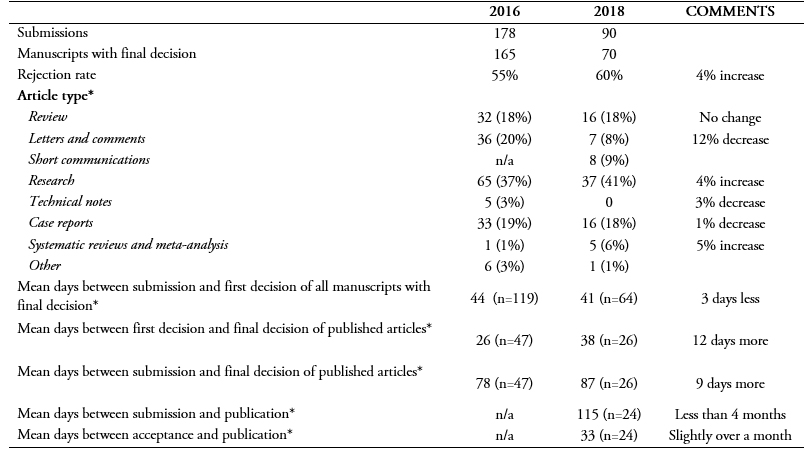 Para Descargar PDF debe Abrir sesión.
Para Descargar PDF debe Abrir sesión.
In mid-2017, we published an editorial in which we communicated our readership that we would start charging authors a fee for their accepted manuscripts.1 The decision to levy article-processing charges is a harsh decision, and we had postponed it for many years, despite the evident need to generate revenues that could ensure long-term sustainability for the journal. Back then, we relied solely on the sister Medwave companies to buttress the costs of running and publishing a journal, but the economic downturns and market changes left us no other choice. We set up the terms, updated our editorial policies to make it very clear that to continue our open access policy we had to charge, and clinched our teeth waiting for the worst.
As expected, there was an immediate drop in submissions, which did not affect us in the short term—we had a reasonable number of manuscripts still in the pipeline. However, after a few months, in early 2018, submissions dwindled and this affected the number of articles that we published. In the first few months after instituting our new policy, we did not receive any income from editorial processing fees. By March/April of 2018, slowly but surely, we started to receive submissions from authors who a) where well aware of having to pay and b) were willing to pay the charges (we have a small submission fee and a more substantial publication fee).
I will now describe the impact that this policy has had on several journal indicators. I will also provide journal indicators that authors are interested in, but unrelated to this policy.
In Table 1, we can see how 2018 compares to 2016, the last full year in which no author processing charges were applied. The following findings stand out:
The table also includes indicators on wait times after submission of a manuscript. These indicators are very important to authors in the academic field, who are under pressure from their institutions to publish. Here too, we are pleased to report that our mean numbers are consistently up-to-par, to what the scholarly publishing industry has unofficially set as best practices. More to the point, in Medwave it takes authors on average less than four months from submission to publication, a bit over a month from acceptance to publication, and less than a month and a half between submission and first decision. These periods are in part under our editorial control, but in part also depend upon the author's initiative (e.g., submitting a corrected version of their manuscript promptly, or not). Consequently, overall, these numbers are good.
Many different and fascinating issues are involved in running a journal—publication ethics, scholarly preservation standards, dissemination, publishing in two languages, and so on. In this editor's note, I have touched upon an operational one: the rejection rate and the wait times. We know you want to get your paper out there as soon as possible while safeguarding proper editorial and peer review standards. We are doing our best given our resources to ensure that the service we provide to our authors and readers is the best possible.
Interests
Vivienne C. Bachelet is the editor-in-chief of Medwave, a self-published journal. In this capacity, she is responsible for both editorial decisions and journal management.

 Table 1. Journal indicators, comparing 2016 to 2018, taking into account only unsolicited submissions.
Table 1. Journal indicators, comparing 2016 to 2018, taking into account only unsolicited submissions.
 Esta obra de Medwave está bajo una licencia Creative Commons Atribución-NoComercial 3.0 Unported. Esta licencia permite el uso, distribución y reproducción del artículo en cualquier medio, siempre y cuando se otorgue el crédito correspondiente al autor del artículo y al medio en que se publica, en este caso, Medwave.
Esta obra de Medwave está bajo una licencia Creative Commons Atribución-NoComercial 3.0 Unported. Esta licencia permite el uso, distribución y reproducción del artículo en cualquier medio, siempre y cuando se otorgue el crédito correspondiente al autor del artículo y al medio en que se publica, en este caso, Medwave.

 Autora:
Vivienne C. Bachelet[1]
Autora:
Vivienne C. Bachelet[1]

Citación: Bachelet VC. Getting your paper published fast: Medwave stats before and after introducing author fees. Medwave 2019;19(2):e7587 doi: 10.5867/medwave.2019.02.7587
Fecha de publicación: 4/3/2019

Nos complace que usted tenga interés en comentar uno de nuestros artículos. Su comentario será publicado inmediatamente. No obstante, Medwave se reserva el derecho a eliminarlo posteriormente si la dirección editorial considera que su comentario es: ofensivo en algún sentido, irrelevante, trivial, contiene errores de lenguaje, contiene arengas políticas, obedece a fines comerciales, contiene datos de alguna persona en particular, o sugiere cambios en el manejo de pacientes que no hayan sido publicados previamente en alguna revista con revisión por pares.
Aún no hay comentarios en este artículo.
Para comentar debe iniciar sesión
 Medwave publica las vistas HTML y descargas PDF por artículo, junto con otras métricas de redes sociales.
Medwave publica las vistas HTML y descargas PDF por artículo, junto con otras métricas de redes sociales.